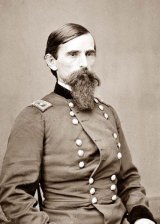Ben-Hur Page #14
Ben-Hur: A Tale of the Christ is a novel by Lew Wallace, published by Harper and Brothers on November 12, 1880, and considered "the most influential Christian book of the nineteenth century". It became a best-selling American novel, surpassing Harriet Beecher Stowe's Uncle Tom's Cabin in sales.
to be of the house of David was yet another; on the tongue of a Hebrew there could be no higher boast. A thousand years and more had passed since the boyish shepherd became the successor of Saul and founded a royal family. Wars, calamities, other kings, and the countless obscuring processes of time had, as respects fortune, lowered his descendants to the common Jewish level; the bread they ate came to them of toil never more humble; yet they had the benefit of history sacredly kept, of which genealogy was the first chapter and the last; they could not become unknown, while, wherever they went In Israel, acquaintance drew after it a respect amounting to reverence. If this were so in Jerusalem and elsewhere, certainly one of the sacred line might reasonably rely upon it at the door of the khan of Bethlehem. To say, as Joseph said, "This is the house of my fathers," was to say the truth most simply and literally; for it was the very house Ruth ruled as the wife of Boaz, the very house in which Jesse and his ten sons, David the youngest, were born, the very house in which Samuel came seeking a king, and found him; the very house which David gave to the son of Barzillai, the friendly Gileadite; the very house in which Jeremiah, by prayer, rescued the remnant of his race flying before the Babylonians. The appeal was not without effect. The keeper of the gate slid down from the cedar block, and, laying his hand upon his beard, said, respectfully, "Rabbi, I cannot tell you when this door first opened in welcome to the traveller, but it was more than a thousand years ago; and in all that time there is no known instance of a good man turned away, save when there was no room to rest him in. If it has been so with the stranger, just cause must the steward have who says no to one of the line of David. Wherefore, I salute you again; and, if you care to go with me, I will show you that there is not a lodging-place left in the house; neither in the chambers, nor in the lewens, nor in the court--not even on the roof. May I ask when you came?" "But now." The keeper smiled. "'The stranger that dwelleth with you shall be as one born among you, and thou shalt love him as thyself.' Is not that the law, Rabbi?" Joseph was silent. "If it be the law, can I say to one a long time come, 'Go thy way; another is here to take thy place?'" Yet Joseph held his peace. "And, if I said so, to whom would the place belong? See the many that have been waiting, some of them since noon." "Who are all these people?" asked Joseph, turning to the crowd. "And why are they here at this time?" "That which doubtless brought you, Rabbi--the decree of the Caesar"--the keeper threw an interrogative glance at the Nazarene, then continued--"brought most of those who have lodging in the house. And yesterday the caravan passing from Damascus to Arabia and Lower Egypt arrived. These you see here belong to it--men and camels." Still Joseph persisted. "The court is large," he said. "Yes, but it is heaped with cargoes--with bales of silk, and pockets of spices, and goods of every kind." Then for a moment the face of the applicant lost its stolidity; the lustreless, staring eyes dropped. With some warmth he next said, "I do not care for myself, but I have with me my wife, and the night is cold--colder on these heights than in Nazareth. She cannot live in the open air. Is there not room in the town?" "These people"--the keeper waved his hand to the throng before the door--"have all besought the town, and they report its accommodations all engaged." Again Joseph studied the ground, saying, half to himself, "She is so young! if I make her bed on the hill, the frosts will kill her." Then he spoke to the keeper again. "It may be you knew her parents, Joachim and Anna, once of Bethlehem, and, like myself, of the line of David." "Yes, I knew them. They were good people. That was in my youth." This time the keeper's eyes sought the ground in thought. Suddenly he raised his head. "If I cannot make room for you," he said, "I cannot turn you away. Rabbi, I will do the best I can for you. How many are of your party?" Joseph reflected, then replied, "My wife and a friend with his family, from Beth-Dagon, a little town over by Joppa; in all, six of us." "Very well. You shall not lie out on the ridge. Bring your people, and hasten; for, when the sun goes down behind the mountain, you know the night comes quickly, and it is nearly there now." "I give you the blessing of the houseless traveller; that of the sojourner will follow." So saying, the Nazarene went back joyfully to Mary and the Beth-Dagonite. In a little while the latter brought up his family, the women mounted on donkeys. The wife was matronly, the daughters were images of what she must have been in youth; and as they drew nigh the door, the keeper knew them to be of the humble class. "This is she of whom I spoke," said the Nazarene; "and these are our friends." Mary's veil was raised. "Blue eyes and hair of gold," muttered the steward to himself, seeing but her. "So looked the young king when he went to sing before Saul." Then he took the leading-strap from Joseph, and said to Mary, "Peace to you, O daughter of David!" Then to the others, "Peace to you all!" Then to Joseph, "Rabbi, follow me." The party were conducted into a wide passage paved with stone, from which they entered the court of the khan. To a stranger the scene would have been curious; but they noticed the lewens that yawned darkly upon them from all sides, and the court itself, only to remark how crowded they were. By a lane reserved in the stowage of the cargoes, and thence by a passage similar to the one at the entrance, they emerged into the enclosure adjoining the house, and came upon camels, horses, and donkeys, tethered and dozing in close groups; among them were the keepers, men of many lands; and they, too, slept or kept silent watch. They went down the slope of the crowded yard slowly, for the dull carriers of the women had wills of their own. At length they turned into a path running towards the gray limestone bluff overlooking the khan on the west. "We are going to the cave," said Joseph, laconically. The guide lingered till Mary came to his side. "The cave to which we are going," he said to her, "must have been a resort of your ancestor David. From the field below us, and from the well down in the valley, he used to drive his flocks to it for safety; and afterwards, when he was king, he came back to the old house here for rest and health, bringing great trains of animals. The mangers yet remain as they were in his day. Better a bed on the floor where he has slept than one in the court-yard or out by the roadside. Ah, here is the house before the cave!" This speech must not be taken as an apology for the lodging offered. There was no need of apology. The place was the best then at disposal. The guests were simple folks, by habits of life easily satisfied.
Translation
Translate and read this book in other languages:
Select another language:
- - Select -
- 简体中文 (Chinese - Simplified)
- 繁體中文 (Chinese - Traditional)
- Español (Spanish)
- Esperanto (Esperanto)
- 日本語 (Japanese)
- Português (Portuguese)
- Deutsch (German)
- العربية (Arabic)
- Français (French)
- Русский (Russian)
- ಕನ್ನಡ (Kannada)
- 한국어 (Korean)
- עברית (Hebrew)
- Gaeilge (Irish)
- Українська (Ukrainian)
- اردو (Urdu)
- Magyar (Hungarian)
- मानक हिन्दी (Hindi)
- Indonesia (Indonesian)
- Italiano (Italian)
- தமிழ் (Tamil)
- Türkçe (Turkish)
- తెలుగు (Telugu)
- ภาษาไทย (Thai)
- Tiếng Việt (Vietnamese)
- Čeština (Czech)
- Polski (Polish)
- Bahasa Indonesia (Indonesian)
- Românește (Romanian)
- Nederlands (Dutch)
- Ελληνικά (Greek)
- Latinum (Latin)
- Svenska (Swedish)
- Dansk (Danish)
- Suomi (Finnish)
- فارسی (Persian)
- ייִדיש (Yiddish)
- հայերեն (Armenian)
- Norsk (Norwegian)
- English (English)
Citation
Use the citation below to add this book to your bibliography:
Style:MLAChicagoAPA
"Ben-Hur Books." Literature.com. STANDS4 LLC, 2024. Web. 26 Nov. 2024. <https://www.literature.com/book/ben-hur_1675>.




Discuss this Ben-Hur book with the community:
Report Comment
We're doing our best to make sure our content is useful, accurate and safe.
If by any chance you spot an inappropriate comment while navigating through our website please use this form to let us know, and we'll take care of it shortly.
Attachment
You need to be logged in to favorite.
Log In